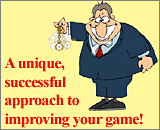|
There is a huge difference between the top players in the world (like Nack Ballard and Neil Kazaross) and really good tournament players like myself. I think to some extent the difference is simply a matter of degree ... they have studied the game longer, or better, or are able to do the math somewhat better, or they have a somewhat better grasp of the feel of the game.
Some of the things that make them better we probably have no way of testing ... like their toughness under fire, their great competitive spirit, a strong desire to win, a never-give-up attitude, an ability to remain intense and make the best plays every play no matter what the score or how simple the situation might appear, etc. etc. I'm not sure you can measure someone's gamesmanship abilities.
But there are some things that can be measured. I am willing to bet that all of the very top players have a very high I.Q. They are simply smarter than most of us to begin with. I am willing to bet that they all have great math skills. (When Joe Sylvester lived with me and we discussed cube decisions, he went through the math involved, out loud, that he was doing in his head to determine doubling and take points at various scores in the match. I am very good at math, but I would never be able to make calculations in my head as he does, and as I have heard Neil Kazaross, Jake Jacobs and others of that ilk do.) They also have amazing memories ... they are able to bring up equity tables, odds, and positions from memory so they don't have to try to work them out in their head every time.
Now, my guess is that you can go through the list of Open Championship level players and find a few with an I.Q. as high as the greats. And maybe, given enough time and desire, those people could become great players too. But I will bet you that it takes a combination of both the I.Q. and those "immeasurable" traits to make it, along with much study and practice.
One conversation with Jake Jacobs about a play will tell you everything. He looks at the position and gives you a general estimate of what your strategy is ... that you want to play a holding game, or you want to counter-time your opponent ... whatever. Then he works out a bunch of complicated math in his head to determine what match equity numbers affect cube and checker play decisions and whether to play more offensively or defensively, etc. Then, he can tell you about other matches he has played, watched or read about where a similar position came up. ("This looks like the game Robertie played against Kit in 4th round of the 1991 Vegas tournament. I remember the great looking blonde eating a pepperoni pizza at the next table when Robertie broke his prime to go for the gammon with a 4-3 and hit Kit off the 4 point.") And then he decides what the best play should be.
In my finals match against Neil Kazaross at the 27th Pittsburgh Backgammon Championships in February, there was one play I asked him about during the match where he told me he was pretty sure his play was better by at least .025 but probably not much more than .032. And though I didn't check it, I have checked him on this in the past, and he's usually right on. That kind of skill can only come from superior intellect, study, and memory, and game-playing insights and abilities.
So, am I saying that your two friends, like me, can never hope to be among the greats? Probably. You'd probably know by now if they are of the genius ilk, and if they are not, it is not likely the can ever be one of the greats. But if they follow the advice in my article below, they can surely be competitive.
But here is my best advice, and as much as possible, I follow this advice more than anything, as I believe it is the key to being successful in any competition: Always try to play people who are worse than you! I am not able to do this in tournament play, but when it comes to playing for money, particularly big money, it is my mantra.
|

